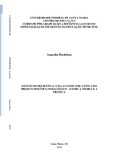| dc.contributor.advisor | Pereira, Sueli Menezes | |
| dc.creator | Predebon, Anacélia | |
| dc.date.accessioned | 2017-11-07T14:52:50Z | |
| dc.date.available | 2017-11-07T14:52:50Z | |
| dc.date.issued | 2016-08-26 | |
| dc.date.submitted | 2016 | |
| dc.identifier.uri | http://repositorio.ufsm.br/handle/1/11983 | |
| dc.description | Monografia (especialização) - Universidade Federal de Santa Maria, Centro de Educação, Curso de Especialização em Gestão da Educação Municipal, EaD, RS, 2016. | por |
| dc.description.abstract | This study aims to discuss, analyze and stimulate reflections about the democratic management, from the construction, implementation and evaluation of the Pedagogic Political Project of the School of Agricultural Elementary School, Forest and Environmental - EMAFA of Ilópolis/ RS. It is a qualitative research type Case Study. To this end, questionnaires were used, which were answered by teachers and that school management team. As a reflection arising from this research, it was found that the Pedagogical Political Project, the school in question was the result of a partially democratic construction, the main obstacle on the construction and implementation aspect related to participation. It was also concluded that the main action to be taken urgently by the school in question is the assessment of your PPP, because it is not rated for 10 years. Also it can be seen that most of the respondents have knowledge of many democratic principles, but do not apply them in their daily lives. Through this study also realized the need of the operationalization of the Pedagogic Political Project in the school, so the school effectively reach their goals and their social role, being of fundamental importance that the construction and follow-up, are grounded in participative management, where decisions are democratized and thus involved see themselves as an integral and fundamental part of the educational process and can not be seen the Pedagogical Political Project only as a framework of regulatory nature. Finally, it is concluded in particular that the only way for the democratic management happens in school is that it is experienced as a process in all school management bodies and can not be seen only as an end to be achieved. | eng |
| dc.language | por | por |
| dc.publisher | Universidade Federal de Santa Maria | por |
| dc.rights | Acesso Aberto | por |
| dc.rights | Attribution-NonCommercial-NoDerivatives 4.0 International | * |
| dc.rights.uri | http://creativecommons.org/licenses/by-nc-nd/4.0/ | * |
| dc.subject | Gestão democrática | por |
| dc.subject | Educação | por |
| dc.subject | PPP (Projeto político-pedagógico) | por |
| dc.title | Gestão democrática: uma análise sob a ótica do projeto político-pedagógico - entre a teoria e a prática | por |
| dc.type | Trabalho de Conclusão de Curso de Especialização | por |
| dc.degree.local | Polo de Santa Maria, RS, Brasil | por |
| dc.degree.specialization | Gestão da Educação Municipal, EaD | por |
| dc.description.resumo | Este estudo objetiva discutir, analisar e desencadear reflexões acerca da gestão democrática, a partir da construção, implementação e avaliação do Projeto Político-Pedagógico da Escola Municipal de Ensino Fundamental Agrícola, Florestal e Ambiental - EMAFA de Ilópolis/RS. É uma pesquisa de caráter qualitativo tipo Estudo de Caso. Para tanto, foram utilizados questionários, os quais foram respondidos pelos professores e equipe diretiva da referida escola. Como reflexão decorrente dessa pesquisa, constatou-se que o Projeto Político-Pedagógico, da escola em questão, foi fruto de uma construção parcialmente democrática, tendo como principal entrave relativo à sua construção e implementação, o aspecto referente à participação. Concluiu-se também, que a principal medida a ser tomada urgentemente pela escola em questão é a avaliação do seu PPP, pois o mesmo não é avaliado há 10 anos. Pode verificar que grande parte dos entrevistados possuem o conhecimento de muitos princípios democráticos, porém não os aplicam em seu cotidiano. Através desse estudo também, percebeu-se a necessidade da operacionalização do Projeto Político-Pedagógico no âmbito escolar, para que a escola efetivamente alcance os seus objetivos e seu papel social, sendo de fundamental importância que a construção e o acompanhamento do mesmo, estejam alicerçados em uma gestão participativa, em que as decisões sejam democratizadas e, assim, os envolvidos percebam-se como parte integrante e fundamental do processo educativo, não podendo ser visto o Projeto Político-Pedagógico apenas como um marco de cunho regulatório. Por fim, conclui-se especialmente que o único caminho para que a gestão democrática aconteça na escola é que a mesma seja vivenciada como processo em todas as instâncias de gestão da escola, não podendo ser vista somente como um ponto final a ser alcançado. | por |
| dc.publisher.country | Brasil | por |
| dc.publisher.initials | UFSM | por |
| dc.subject.cnpq | CNPQ::CIENCIAS HUMANAS::EDUCACAO | por |
| dc.publisher.unidade | Centro de Educação | por |



